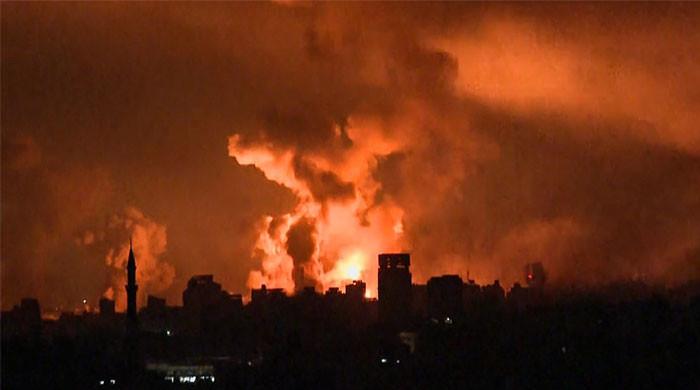With suspended phone and internet services, various media and humanitarian organisations have warned that the communications blackout might subject the besieged Gaza Strip to Israeli war crimes.
According to Palestinian telecom company Jawwal, Israel’s indiscriminate bombing has destroyed “all remaining international routes connecting Gaza to the outside world”.
The Gaza Strip after being subjected to some of the fiercest Israeli bombings, has been cut off from the world for two days amid reports by Hamas of Israeli forces making a few small ground incursions throughout the night.
Nida Ibrahim, reporting for Al Jazeera from Ramallah in the occupied West Bank, said on Saturday that there was “very, very minimal” information coming out of the Gaza Strip.
“After Gaza went into darkness with no communications, no phones, no internet connections, Palestinians here outside of Gaza and elsewhere … feel that they are also being kept in the dark about what’s going on,” Ibrahim said.
“They can’t check on their friends, on their loved ones [and] family members to check if they’re alive or not.”
Amnesty International said it had lost contact with its colleagues in Gaza and the lack of communications was making it increasingly challenging to document rights abuses.
“This communications blackout means that it will be even more difficult to obtain critical information and evidence about human rights violations and war crimes being committed against Palestinian civilians in Gaza, and to hear directly from those experiencing the violations,” Erika Guevara Rosas, senior director of research, advocacy, policy, and campaigns, said in a statement on Friday.
The blackout runs the risk of “providing cover for mass atrocities and contributing to impunity for human rights violations,” according to Deborah Brown, senior technology and human rights researcher at Human Rights Watch.
Cindy McCain, executive director of the UN World Food Programme, said on Twitter, now X, that the WFP has “lost contact” with its Gaza teams.
“The silence is deafening,” she wrote.
Before an anticipated full-scale ground attack on the enclave, Israel increased its bombardment of Gaza, causing communications services to collapse.
In a post on X, World Health Organisation director-general Tedros Adhanom Ghebreyesus stated that the darkness is “making it impossible for ambulances to reach the injured.”
“We are still out of touch with our staff and health facilities. I’m worried about their safety,” he said.
Additionally, the Committee to Protect Journalists issued a warning, stating that there could be “serious consequences” from the “news blackout,” including the propagation of false information.
Because of the cutoff, the exact number of casualties from attacks and the specifics of ground combat may not be known right away. A small number of satellite phones remained operational.
Although there have been occasional updates from Al Jazeera correspondents in the Gaza Strip via satellite, direct connection is frequently impeded by the enclave’s almost complete communications blackout.
Reporting from Gaza City on Friday, Safwat Kahlout of Al Jazeera stated that the most recent Israeli air raids were significantly more intense than earlier ones.
“Today is the worst in terms of the strength of the Israeli fire, and we can hear some explosions … coming from the sea as well, specifically in the north of the Gaza Strip,” Kahlout said.
Reporting from Khan Younis in Gaza, Tareq Abu Azzoum of Al Jazeera stated on Friday that the people there were left “totally isolated” and were “terrified and afraid.”
Israel has responded to Hamas’s October 7 attacks inside the nation with many airstrikes on Gaza, claiming that 1,405, primarily civilians, were killed.
Palestinian officials claim that Israeli airstrikes have killed at least 7,703 Palestinians, including 3,595 children.















































